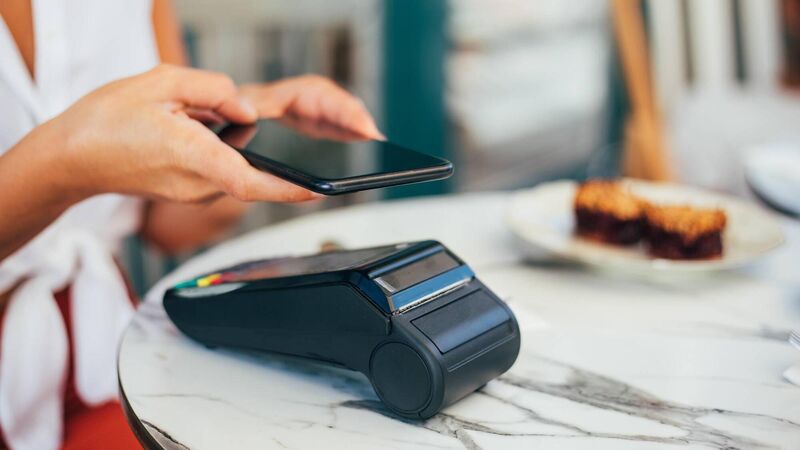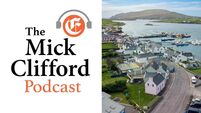Cash or card? Cashless society begins to take hold

EU-wide, the proportion of cash payments declined from 86% in 2019 to 73% in 2022.
At the Mardyke Arena, UCC’s gym and pool facility, a large sign on the counter tells the clientele that, “for your safety,” cash is no longer accepted.
It’s an increasingly common sight in a variety of businesses, and, as with many others, the Mardyke Arena’s move away from cash first came during covid in 2020, manager Barry Dunne explains.
“Initially we went cashless because it was an extra point of contact during covid,” explains Mr Dunne, who has worked at the gym for 21 years.
“Once we got over the initial resistance, because a lot of elderly members needed to get used to the tapping system, it was working out much better for everybody, so we just kept the system. We advertise that it’s card payments only, but we do accept cheques, so it’s just cash that we stopped.”
Even though it’s now generally accepted that fomites — pathogen-carrying surfaces — do not play a large role in spreading covid, in the early uncertainty regarding how the virus was transmitted, cash was honed in on as a potential danger.
Research from the European Central Bank (ECB) shows the extent to which covid has had lasting impacts on payment methods.
EU-wide, the proportion of cash payments declined from 86% in 2019 to 73% in 2022. Mobile app payments more than tripled in number of transactions between 2019 and 2022, from 3% to 10%. One-off online payments increased from 6% in 2019 to 17% in 2022.
But what happens to those that can’t, or don’t want to, ditch cash?
The Mardyke Arena offers a value deal for pensioners and as a result, there’s a high proportion of over-65s amongst their clientele.
In 2018, Age Action Ireland warned that people over the pension age were at risk of digital exclusion, with half of the 65-74 age group never having used the internet. But Mr Dunne says most of his older gym members made the transition to cashless payment options relatively painlessly.
“To be perfectly honest, we had a couple of members that didn’t have bank accounts and they didn’t think it was a fair system,” he says. “But I directed them to An Post’s system, where you can prepay a card to use as a debit card, so that worked out.
“We’ve had Ukrainian refugees who didn’t have bank accounts and we did accept cash for them, so we’ve made an exception for some groups coming in.”
Given the benefits and convenience for the staff and the business, Mr Dunne says, it’s very unlikely that the Mardyke Arena will ever reverse the decision to stop accepting cash.
“It’s not proving to be an issue and it’s more beneficial to us as a company in terms of our accounts, so I’d imagine it will stay,” he says.
As more and more businesses either remain cashless post-covid or decide to start refusing cash, not everyone is comfortable with the move. The same ECB report that found a post-covid increase in cashless transactions also noted, paradoxically, that people across Europe “overwhelmingly” want to retain the option to pay cash.
Cork restaurauteur Paul Dolan, who owns The Barn Gastropub in Glanmire, defended his decision to remain cashless post-covid when he came under renewed fire on social media this month.
Last July, AIB reversed its decision to remove cash services for customers at 70 branches nationwide following significant public and political opposition.
The GAA signed a five-year deal for digital-only tickets with Ticketmaster in December 2020: this applies to all stadia including Páirc Uí Caoimh. Again, there has been some backlash against this move, not least when a problem with the Ticketmaster website during last year’s Allianz Hurling League left fans unable to purchase tickets one Sunday.
But Cork County Board say they are keenly aware of the impacts of digital-only ticketing on some fans, which is why the GAA have a retail network in Centra and Supervalu stores nationwide “to ensure that those who may have difficulty with online technology are catered for and to accommodate all groups".
Some essential state services also got used to the convenience of eliminating cash-handling during covid.
Kerry TD Michael Healy-Rae slammed the National Driver’s Licence Service (NDLS) last week for refusing to accept €35 from a 75-year-old constituent of his, who Mr Healy-Rae said was embarrassed to have to call on a friend to come to the NDLS and make a card payment on his behalf.
The NDLS has been cashless since June 2020, a press representative told the .
“The decision was made to not accept cash after evaluating security, administration, and value for money factors,” the spokesperson said in an emailed statement.
“Card payment is significantly the most predominant means of payments. The NDLS allows an accompanying person make card payments for customers who do not have cards themselves.”
A Retail Banking Review published by the Department of Finance in November 2022 has stressed the need to legislate to protect cash.
“A legislative framework should be put in place to manage any further decline in the cash infrastructure in a fair, transparent and equitable manner” in line with the ECB findings, the review team recommended.
They said the Department of Finance should develop 'access to cash' legislation in 2023 to ensure reasonable access to cash services for consumers and SMEs, and to prepare a National Payments Strategy by 2024.
Dr Olive McCarthy says this could spell the end of essential state services, like the NDLS, being able to refuse cash.
“They want the department to consider ‘if it should be Government policy that public bodies should accept or facilitate the acceptance of cash for the payment of goods, services, taxes, levies, fees or charges.’ So we may see change in this area,” Dr McCarthy says.
Dr McCarthy is director of the Centre for Co-operative Studies at UCC, and she’s interested in the ways in which refusing cash can become a form of financial exclusion.
“Not everyone may have accessed a bank account for a variety of reasons,” she says. “Not everyone will have credit or debit cards, and not everyone feels comfortable using them.
Twelve per cent of approved housing body Clúid’s social housing tenants don’t have a bank account, a report she co-authored, Financial Inclusion Among Social Housing Tenants, found.
For those on or near the breadline, tangible currency can be easier to manage and budget with: while 45% of social housing tenants were “making ends meet,” just 25% reported being strong at keeping track of their finances, while 9% were able to plan ahead.
“For those on lower incomes, you can see what’s in your pocket, what you have to spend at any given time,” she says. “When you have a debit card it’s so easy to tap and much harder to keep track of what you’re spending.”
Many people see avoiding carrying cash as a security measure, but Dr McCarthy points to the prevalence and increasing sophistication of online scams, as well as the relative vulnerability of those with low digital literacy to these.

For children, teaching financial literacy and independence begins with cash, Dr McCarthy, who has an eight-year-old son, says: “If you’re teaching kids about money, it’s much easier to do that with hard cash that they can count and see.”
“Think about first holy communion or confirmation, where relatives put some money into an envelope, for example, we’re hardly going to ask kids to use a debit card system for that. Or the whole idea of a piggy bank and
encouraging children to save. Cash is a much better way to do that.”
Precarious workers who rely on tips for part of their income, buskers, beggars, and charities are among others who may depend on cash, Dr McCarthy says.
Whatever about state services, banks and sporting events, for SMEs, profit is the bottom line and it’s the high cost of cash that counts.
While contactless payments are free to the user for most banking customers, the business is charged around .19% per transaction.
But bank charges on handling cash are 1.25%, and set to increase to 2%, Alan Andrews says. This is outside other costs such as higher insurance for cash-handling businesses as well as additional staff time to make physical trips to the bank, where they are also charged for coins.
Mr Andrews owns Guji Coffee, a hip coffee stall operating out of a pink shipping container outside Cork city’s popular Marina Market.

As well as Guji Coffee, he also owns The Old Barracks coffee roastery in Birdhill, Co Tipperary and Dock Road in Limerick City, as well as another café in Nenagh, Co Tipperary.
He says he had had security concerns about Guji Coffee before they decided to go cashless last October, but that “the larger issue is the cost of going to the bank. The bank charges are just about to go up to 2%. That means for every €100 we earn, €2 goes just on bank charges. It’s crazy.”
Operating seven cash tills from four locations is a logistical nightmare: staff at each location have to reconcile their take and make it to the bank before it closes. So, while The Old Barracks venues still accept cash, Mr Andrews decided that Guji Coffee was going to decline it.
“We’ve had a couple of comments, and I understand where they’re coming from, but it’s important to see things from both sides,” he says.
Complaints have been few and far between, he says; this is in part because there are other coffee options nearby. If you want coffee but don’t have a card, you can stroll to another stall. But the age profile of the customers at the Marina Market, which attracts a young crowd, might be a factor, Mr Andrews believes.
As younger generations of digital natives become the generation with the spending power, an evolution away from cash seems inevitable, he says.
“The proportion of what we take in cash has dropped so much anyway. At one stage it would have been €30 euros out of every €100. But by the time we switched before Christmas, it was about €5 out of every €100 that was coming in as cash.”
The ECB report already mentioned is both clear and contradictory: people are increasingly using cashless payments because they are convenient, but they would like to keep cash as an option.
But it’s also clear that businesses like Guji Coffee are going to pay far more attention to real-world spending patterns than to opinions; when it comes to the future of cash, then, the term “use it or lose it” has never been more relevant.
Many people believe that because cash is “legal tender” it is illegal for a business to refuse it.
But it’s not as straightforward as that: while cash is legal tender, businesses don’t have to accept cash in some circumstances.
Individual transactions are governed by contract law in Ireland and terms of settling credit include payment methods.
This means that at present, as long as a business notifies customers in advance that they only accept payment in certain specified methods, they can legally refuse cash.
“If a business specifies payment must be in a form other than cash, the customer cannot subsequently claim a legal right to pay in cash, even if that cash is legal tender. Therefore, under certain circumstances, retail businesses or service providers can refuse to accept payment in cash,” Finance Minister Paschal Donohoe confirmed in a written Dáil answer in December 2022.





